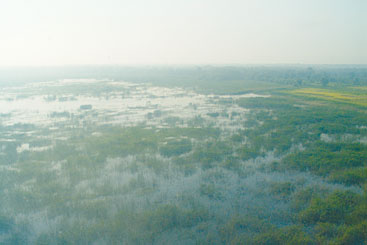
Changing the face of wetlands
A wetlands restoration project in Bulgaria is helping local authorities and communities to adopt new attitudes towardswetlands as well as sustainable natural resources management practices.

The Belene Island restoration site is already showing a dramatic improvement. Water from the Danube River that entered the wetlands during the first flooding in April improved in quality after just a week.
In many communities, wetlands are seen as wastelands; places full of mosquitoes and odd smells; functionless places to be avoided – or better yet, filled in. however, wetlands play a vital role in the health of river systems. They provide rich habitats for a diverse range of plant and animal species, protection from flooding and pollution reduction through their cleansing functions. Restoring wetlands, therefore, is about more than changing landscapes, it’s about changing mindsets.
The Bulgarian Wetlands Restoration and Pollution Reduction Project was launched in October 2002 – the first time a wetlands restoration of this scale has been implemented in Bulgaria. The six-year project will reduce transboundary nutrient pollution loads generated from agriculture, while conserving important endangered species. The project is financed by the Global Environment Facility/World Bank, and co-financed by the Bulgarian government, the EU PHARE programme, the Austrian government and other bilateral donors.
This project has already helped change the perception of wetlands among locals. “The project has introduced a new idea that wetlands are not a necessary evil, making the landscape attractive, as they were perceived in the past,” says Anna Georgieva, Project Task Team Leader and Senior Operations Officer in the Sustainable Development Department of the World Bank. “And now in the course of the project, the local people are actually very much in favour of restoration and even impatient to see the restoration happen.”
“The restored wetlands on belene Island provide a chance for the future tourism development in the region, for new employment opportunities as well as for protection of the Danube river basin from nutrient pollution,” says florian fihtl, world bank Country Director for bulgaria.
Restoring wetlands and floodplains. The wetlands restoration facilities on Belen Island within the Persina Nature Park were officially opened June 23, 2008, by representatives of the Bulgarian Ministry of Environment, the State Forestry Agency and the World Bank in the presence of local partners and stakeholders. Results of the work are already visible. Water from the Danube River that entered the wetlands during the first flooding in April improved in quality after just a week. And as water quality improves, local species have already benefited. “Fish have returned to spawn,” says Georgieva, “and with the fish we also have a return of an increase of rare bird species such as the white-tailed eagle and the Dalmatian pelican.”
The restoration work for the second site, the Kalimok wetlands within the Kalimok/Brushlen Protected Site, is in progress and should be completed by October 2008.
In addition to the restoration work, the project also includes a small grant programme for biodiversity conservation. Mostly targeting awareness-raising, the programme has reached over 5000 people – mostly young people – to communicate the value of wetlands. Also, a small Farmer Transition Support Fund supports demonstration projects, such as organic agriculture for peaches and raspberries, and manure management. “The project is so innovative,” says Georgieva, “and it shows just how much you can do and how many new ideas you can bring with a small sum of money.”
“The project has introduced a new idea that wetlands are not a necessary evil, making the landscape attractive, as they were perceived in the past,“ says anna georgieva, Project Task Team leader and Senior operations officer in the Sustainable Development Department of the world bank.
Managing protected sites. At the start of the project, the administrations for the Persina Nature Park and the Kalimok/Brushlen Protected Site lacked needed equipment, such as off-road vehicles an outboard boats as well as up-to-date monitoring equipment for field work. The project has contributed considerably to outfitting both administrations with necessary tools. “The first step”, says State Forestry Board Representative Spas Todorov, “is complete. Further on we need serious efforts to be taken in order to optimize the management regime of the restored wetlands.”
The capacity of both protected areas administrations has increased as a result of the project’s training programmes. “One of the most valuable parts of the project is that we have brought local people and decision makers together to learn new things and make international contacts,” says Georgieva.
Future outlook. As the project comes close to completion, the results achieved in the last six years are considerable. Florian Fihtl, World Bank Country Director for Bulgaria is positive that “the restored wetlands on Belene Island provide a chance for the future tourism development in the region, for new employment opportunities as well as for protection of the Danube river basin from nutrient pollution”.
Project documents and all reports are available on the project website. For more information, please visit: www.worldbank.bg/wetlands.
Disclaimer
The information contained in the ICPDR website is intended to enhance public access to information about the ICPDR and the Danube River. The information is correct to the best of the knowledge of the ICPDR Secretariat. If errors are brought to our attention we will try to correct them.
The ICPDR, expert group members, nor other parties involved in preparation of information contained on this website cannot, however, be held responsible for the correctness and validity of the data and information provided, nor accept responsibility or liability for damages or losses arising directly or indirectly from the use of the information conveyed therein.
Only those documents clearly marked ICPDR documents reflect the position of the ICPDR.
Any links to other websites are provided for your convenience only. The ICPDR does not accept any responsibility for the accuracy, availability, or appropriateness to the user's purposes, of any information or services on any other website.
When using the information and material provided on this website, credit should be given to the ICPDR.
